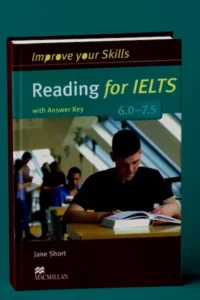Improve Your Skills for IELTS: Reading for IELTS cover all aspects of the IELTS Reading exam for students aiming for an IELTS band score of 6.0-7.5.
What is Improve your Skills: Reading for IELTS 6.0-75?
Reacting for IELTS is part of the Improve your Skills exam skills series: three preparation books which cover all aspects of the IELTS exam for students aiming for an IELTS band score of 6.0-7.5. This course aims to develop the key reading skills, and language and exam techniques for the IELTS Reading paper.
The course can be used together with the other books in the series: Writing for IELTS 6.0-7.5 and Listening & Speaking for IELTS 6.0-7.5.
How do I use Improve your Skills?
You can use any of the books in this series either in class or to study on your own. The course will guide you through the activities step by step, so you can use this book with or without a teacher.
If you are studying as part of a class, your teacher will direct you on how to use each activity. Some activities can be treated as discussions, in which case they can be a useful opportunity to share ideas and techniques with other learners.
How is Improve your Skills: Reading for IELTS organized?
The course is made up of 10 units, each aimed at developing a particular reading skill (e.g., scanning). Every unit is themed around a commonly occurring topic from the IELTS exam. Each unit consists of:
Skills development: explanation, examples and tasks to develop and practise relevant reading skills both for general use and the exam. Each skill is broken down into simple stages with reference to why each skill is important for IELTS.
Vocabulary: useful vocabulary for the IELTS exam.
Exam focus and practice: focus on how each skill relates to the exam, followed by authentic IELTS-style tasks for real exam practice. There are also Skills tip boxes throughout the book containing useful information and ideas on how to approach the different exam reading tasks.
How will Improve your Skills increase my chances of exam success?
Skills development
The skills sections form a detailed syllabus of core reading skills which are useful both in the exam and in everyday life – reading for specific information and understanding attitude and opinion, for example.
People often do these things in their own language without noticing, so it can take some practice to perform these actions in another language. Learning and understanding vocabulary and grammar can take priority in the classroom, and these very important skills can often get ignored.
Language input
Each unit includes useful vocabulary and phrases for the exam. In Improve your Skills: Reacting for IELTS, you will find a wide range of topic vocabulary and ideas to ensure that you are well prepared when you reach the real exam.
Exam technique
In any exam, it is important to be prepared for the types of tasks you are likely to be given, and to have methods ready to answer any particular question. The Skills tip boxes give short, simple advice about different types of questions, as well as study skills and how to effectively use the skills you have learnt. The course covers every question type that you will face in the IELTS exam.
How is the IELTS exam organized and where does reading fit in?
The IELTS exam consists of four papers: Reading, Writing, Speaking and Listening. The Reading paper consists of three reading passages with tasks (a total of 40 questions) and lasts one hour.


